Unit 12 What did you do last weekend Period 4 Section B(2a-2c)课件(共53张PPT,内嵌音频)
文档属性
| 名称 | Unit 12 What did you do last weekend Period 4 Section B(2a-2c)课件(共53张PPT,内嵌音频) |
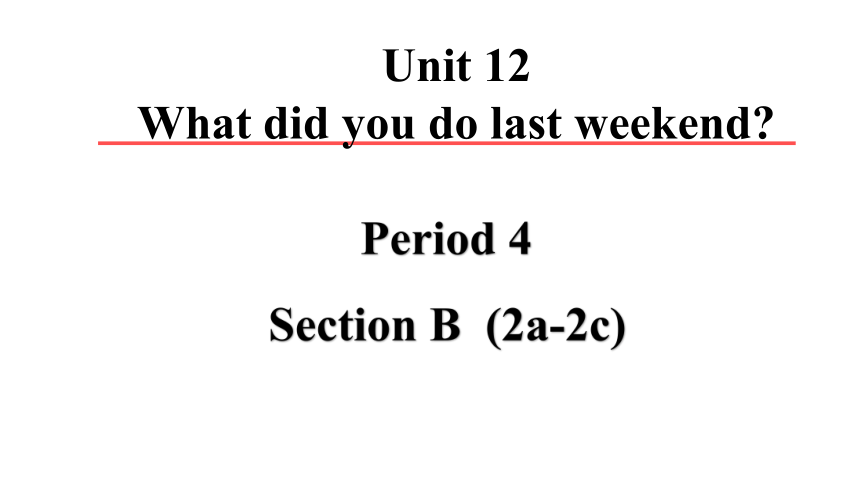
|
|
| 格式 | pptx | ||
| 文件大小 | 16.3MB | ||
| 资源类型 | 教案 | ||
| 版本资源 | 人教新目标(Go for it)版 | ||
| 科目 | 英语 | ||
| 更新时间 | 2023-12-16 00:00:00 | ||
图片预览

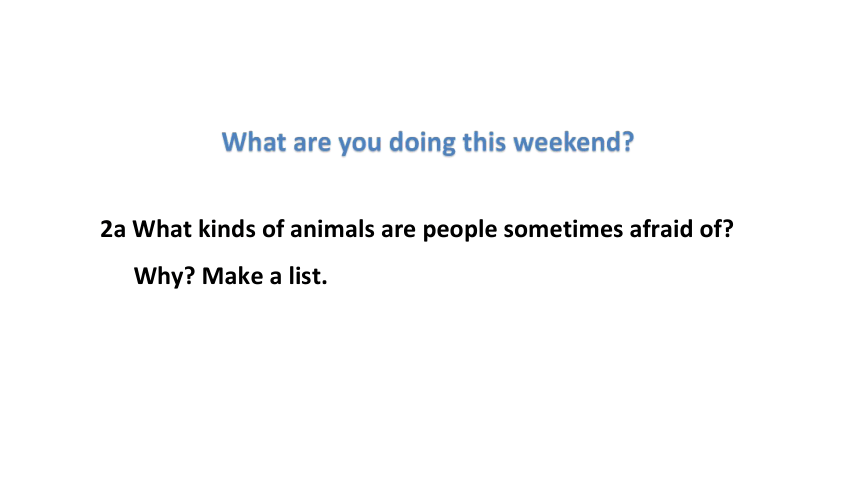
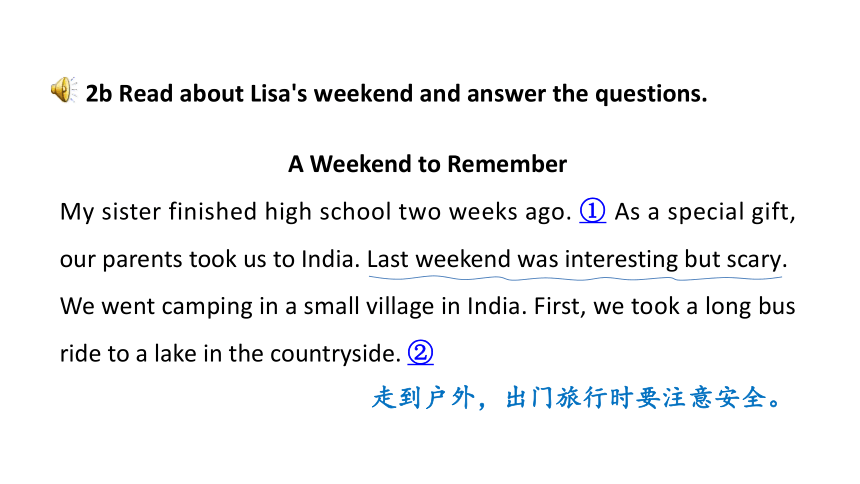
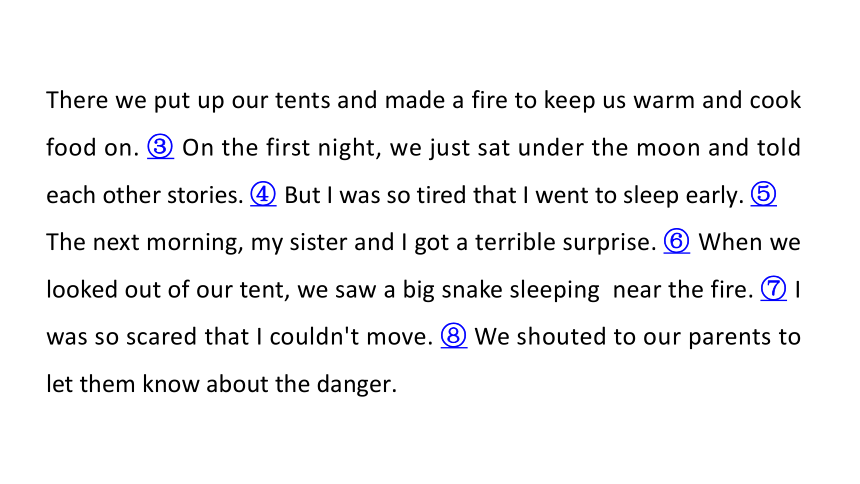
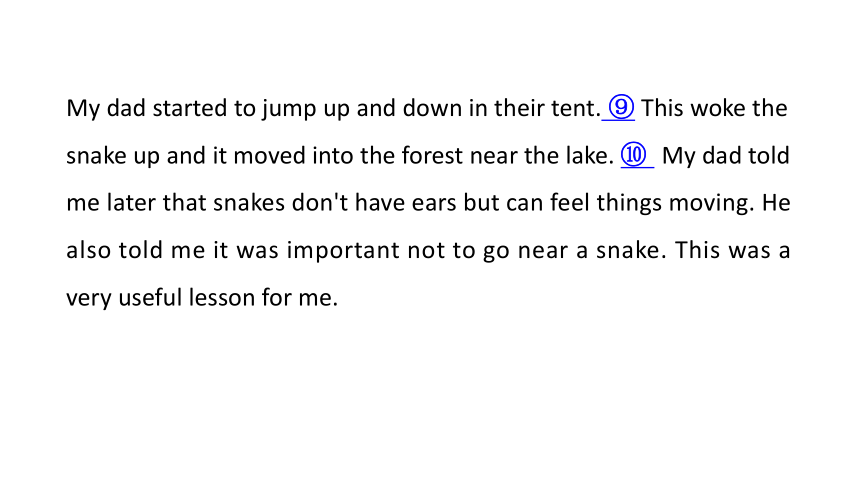

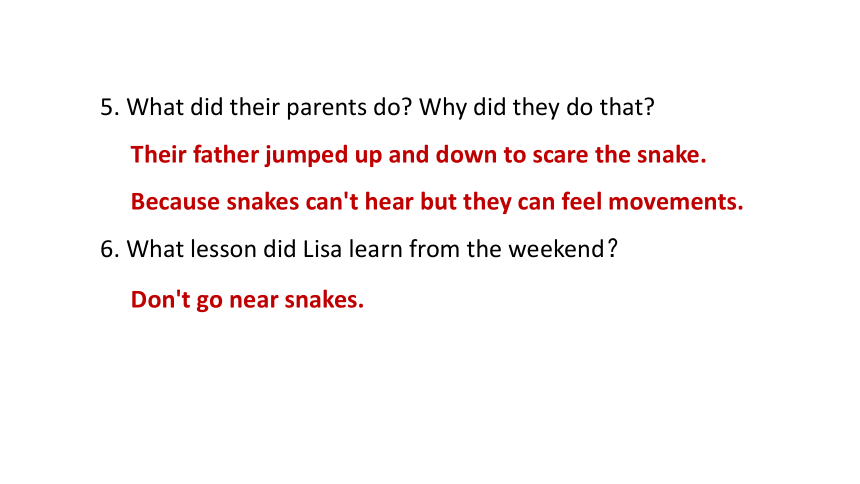
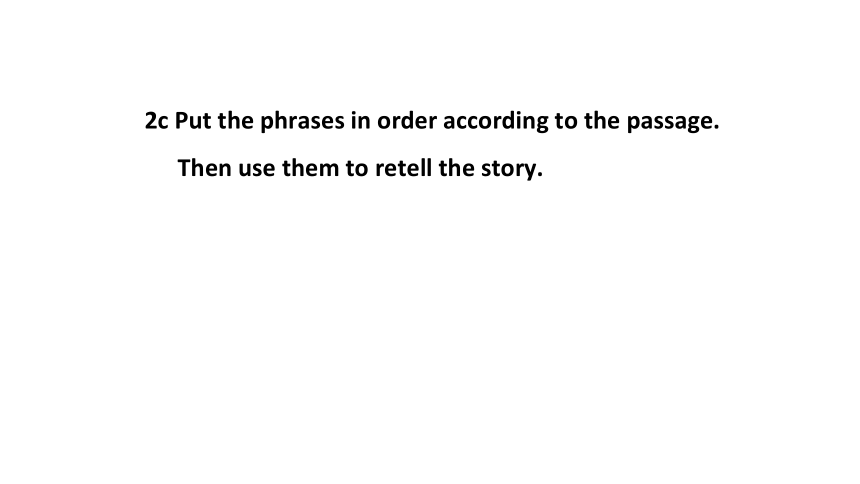
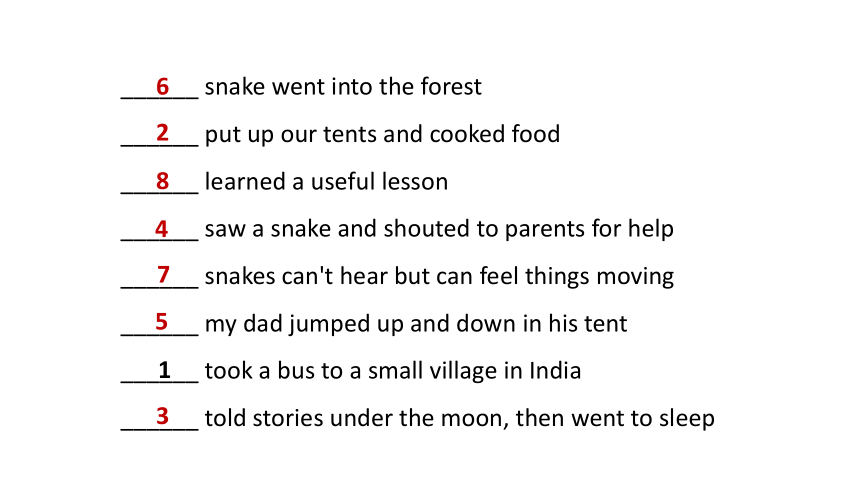
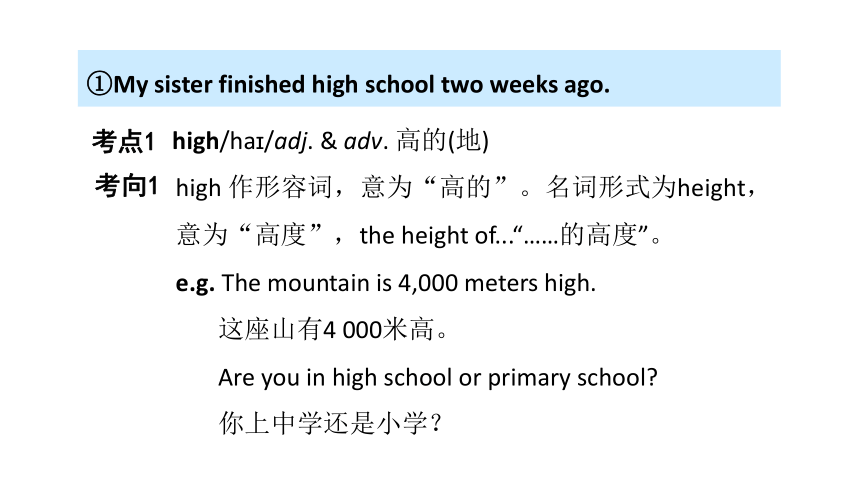
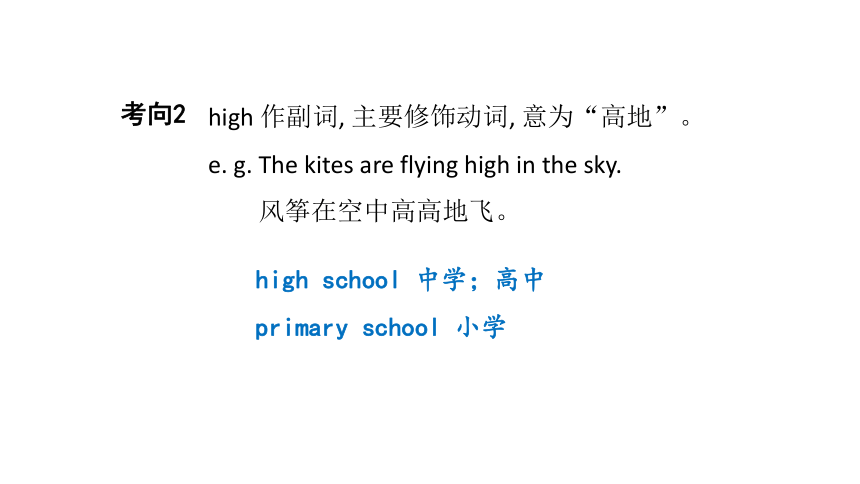
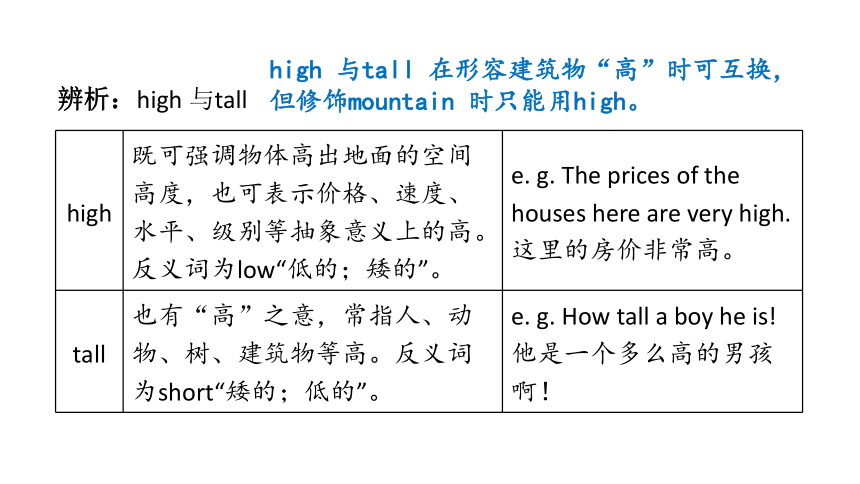
文档简介
(共53张PPT)
Period 4
Section B (2a-2c)
Unit 12
What did you do last weekend
2a What kinds of animals are people sometimes afraid of Why Make a list.
What are you doing this weekend
2b Read about Lisa's weekend and answer the questions.
A Weekend to Remember
My sister finished high school two weeks ago. ① As a special gift, our parents took us to India. Last weekend was interesting but scary.
We went camping in a small village in India. First, we took a long bus ride to a lake in the countryside. ②
走到户外,出门旅行时要注意安全。
There we put up our tents and made a fire to keep us warm and cook food on. ③ On the first night, we just sat under the moon and told each other stories. ④ But I was so tired that I went to sleep early. ⑤
The next morning, my sister and I got a terrible surprise. ⑥ When we looked out of our tent, we saw a big snake sleeping near the fire. ⑦ I was so scared that I couldn't move. ⑧ We shouted to our parents to let them know about the danger.
My dad started to jump up and down in their tent. ⑨ This woke the snake up and it moved into the forest near the lake. ⑩ My dad told me later that snakes don't have ears but can feel things moving. He also told me it was important not to go near a snake. This was a very useful lesson for me.
1. How was Lisa's weekend
2. Where did Lisa and her family go last weekend
3. How did Lisa feel when she saw the snake
4. What did Lisa and her sister do
It was interesting but scary.
They went to a small village in India.
She was so scared that she couldn't move.
They shouted to their parents.
5. What did their parents do Why did they do that
6. What lesson did Lisa learn from the weekend?
Their father jumped up and down to scare the snake. Because snakes can't hear but they can feel movements.
Don't go near snakes.
2c Put the phrases in order according to the passage. Then use them to retell the story.
______ snake went into the forest
______ put up our tents and cooked food
______ learned a useful lesson
______ saw a snake and shouted to parents for help
______ snakes can't hear but can feel things moving
______ my dad jumped up and down in his tent
______ took a bus to a small village in India
______ told stories under the moon, then went to sleep
6
2
8
4
7
5
3
1
①My sister finished high school two weeks ago.
high/ha /adj. & adv. 高的(地)
考点1
high 作形容词,意为“高的”。名词形式为height,意为“高度”,the height of...“……的高度”。
e.g. The mountain is 4,000 meters high.
这座山有4 000米高。
Are you in high school or primary school
你上中学还是小学?
考向1
high 作副词, 主要修饰动词, 意为“高地”。
e. g. The kites are flying high in the sky.
风筝在空中高高地飞。
考向2
high school 中学;高中
primary school 小学
辨析:high 与tall
high 既可强调物体高出地面的空间高度,也可表示价格、速度、水平、级别等抽象意义上的高。反义词为low“低的;矮的”。 e. g. The prices of the houses here are very high.
这里的房价非常高。
tall 也有“高”之意,常指人、动物、树、建筑物等高。反义词为short“矮的;低的”。 e. g. How tall a boy he is!
他是一个多么高的男孩啊!
high 与tall 在形容建筑物“高”时可互换, 但修饰mountain 时只能用high。
考题1:我们市将有一所新高中。
There will be a new ________ _________ in our city.
high school
ago 是一般过去时的标志词,可作为判断时态的依据。常用于“一段时间+ago”的结构中,作时间状语,表示“多长时间以前”。
e.g. I watched this TV program a few days ago.
几天前我看了这个电视节目。
考向
ago/ ɡ / adv. 以前
考点2
辨析:ago 与before
ago 在现在以前 以现在为基准 与一般过去时连用 不可单独作状语
before 在过去以前 以过去为基准 常与完成时或一般过去时连用 可单独作状语
e. g. There wasn’t a high-speed railway station here two years ago.
两年前这里没有高铁站。
He lived here before.
他以前住在这儿。
速记小法:
立足现在看以前,
ago 地位不可撼;
若是过去看以前,
before 出来挑重担。
返回
考题2:They watched the firefighters work two days _______.
A. before B. after
C. ago D. behind
C
②First, we took a long bus ride to a lake in the countryside.
ride /ra d/ n. 旅行;短途旅程
e.g. Would you like to go for a ride/take a ride
你想去兜风吗?
I’ll be late. Can you give me a ride
我要迟到了,你能捎我一程吗?
考点3
ride 还可作动词,“骑;乘”,详见Unit3 Period1考点3。
ride 的常用搭配:
① go for a ride = take a ride 去兜风
② get a ride 搭便车
③ give sb. a ride 捎某人一程
考题3:Let’s go for _________ ______________ _________ (骑自行车出行).
返回
a bicycle/bike ride
③There we put up our tents and made a fire to keep us warm. . .
put up 搭起;举起
put up 是“动词+ 副词”的结构,代词作宾语时要放在put和up 中间。
e.g. They put up a tent to keep warm.
他们搭起帐篷以保暖。
If you can answer the question, please put up your right
hand. 如果你能回答这个问题,请举起右手。
考点4
考向
put 的相关短语:
① put on 穿上(衣服)
② put down 放下;写下
③ put away 放好;把……收起来
④ put off 推迟
⑤ put out 扑灭
拓展:put up 还可意为“张贴”。
e.g. This is our new picture. Let’s put it up on the wall.
这是我们的新照片。让我们把它贴到墙上吧。
考题4:[鄂州] — How was your camping in Sifeng Mountain last weekend
—It was great. We _______ our tents on the top of the mountain and enjoyed ourselves.
A. put up B. put off C. put on D. put away
【点拨】根据“our tents”可知此处应用动词短语put up one’s tent 表示“搭帐篷”。
A
考题5:[河北] We are supposed to _______ our hand before we speak in class.
A. put up B. put out
C. put down D. put away
【点拨】根据“We are supposed to...our hand before we speak in class.”可知,发言之前应该先举手。
返回
A
④On the first night, we just sat under the moon and told each other stories.
each other 互相;彼此
e.g. The two cousins talk to each other by e-mail.
这两个堂兄弟通过电子邮件相互交谈。
We should know each other’s living habits.
我们应该知道彼此的生活习惯。
考点5
each other 相当于one another。所有格形式为 each other's。
考题6:当我们有不同意见时,应该相互理解。
When we have different ideas, we should understand ______________.
返回
each other
⑤But I was so tired that I went to sleep early.
so. . . that. . . 如此……以至于……
考点6
that 后跟的是句子!
“如此……以至于……”的另外一种表达方式是“such + a/an + adj .+ n.+ that 从句”。
e.g. She is such an excellent actress that people like her very much.
她是一位如此优秀的女演员,以至于人们非常喜欢她。
so 后接形容词或副词,that 引导结果状语从句。
so. . . that. . . 如此……以至于…… (that 后接从句) She is so young that she
can’t go to school. 她太小了, 以至于不能去上学。
too. . . to. . . 太……而不能…… (to后接动词原形) She is too young to go to
school.
她太小了而不能去上学。
not. . . enough to. . . 不够……去…… (to 后接动词原形) She is not old enough to go to school.
她还不够大, 不能去上学。
考向
拓展: so that 意为“以便;为了”,引导目的状语从句。
e.g. He got up early so that he could catch the bus.
他起得很早,以便能赶上公共汽车。
考题7:[重庆B 卷] 我太累了以至于不能继续走下去。
I was _______ tired _______ I couldn’t walk on.
【点拨】tired 是形容词,此处用so...that... 结构,引导结果状语从句。
so that
考题8:Tina was so young that she couldn’t dress herself.
(同义句转换)
Tina wasn’t _________ _________ to dress herself.
old enough
返回
⑥The next morning, my sister and I got a terrible surprise.
surprise/s (r) pra z/ n. 惊奇; 惊讶
e. g. What a nice surprise it is! 真是让人惊喜!
考点7
一语辨异:To my surprise, his father wasn’t surprised at the surprising news.
使我感到吃惊的是,他父亲对那个令人吃惊的消息不感到吃惊。
辨析:surprise, surprised 与surprising
surprise n . 惊讶 get a surprise 吃惊
give sb. a surprise 给某人一个惊喜
to one’s surprise 令某人惊讶的是
in surprise 惊奇地;惊讶地
v . 使吃惊 surprise sb. 使某人感到意外
surprised adj . (人) 惊讶的 be surprised at sth.
(人) 对某事/ 物感到惊讶
feel/be surprised to do sth.
(人) 做某事很惊讶
surprising adj . (物) 令人吃惊的 surprising + n. 令人吃惊的事物
e.g. I got a surprise when I saw him.
当我看到他时我吃了一惊。
Bill looked at him in surprise.
比尔惊讶地看着他。
The news surprised us.
这消息使我们吃惊。
We are surprised at his surprising success.
我们对他惊人的成功感到惊讶。
考题9:[无锡] 让我们吃惊的是,这位国际友人擅长烹制中餐。
_____________________, the foreign friend is good at cooking Chinese food.
To our surprise
考题10:[武威] I opened the door and all my friends shouted “Happy Birthday!” I had no idea they were coming. I was so ________.
A. interested B. surprised
C. interesting D. surprising
返回
【点拨】用语境判定法。本句主语为I,故排除选项C、D;根据“我不知道他们来了”可知此处是“我”如此惊讶。
B
⑦When we looked out of our tent, we saw a big snake sleeping near the fire.
look out of 向……外看
look out of 意为“向……外看”,其中out of 表示“从……里面向外”,反义词是into。look out 意为“向外看”,后面不接宾语。
e.g. Please don’t look out of the window in class.
上课时请不要往窗外看。
Nobody is looking out at this time. 此时没有人往外看。
考点8
考向
look 相关短语:
① look at 看……
② look for 寻找
③ look after 照顾
④ look like 看起来像
⑤ look out of 向……外看
拓展:look out 还可意为“当心;小心”。
e.g. Look out! Here comes the car. 小心!小汽车来了。
考题11:[广东] 如果你晕车就不要朝窗外看。
Don’t _________ _________ _________ the window if you feel sick in the car.
look out of
see sb./sth. doing sth. 看见某人/ 某物正在做某事
考点9
用法类似see 这样的感官动词还有hear, watch, feel 等,它们都可以跟do 或doing 连用,意思却不同。
辨析:see sb./sth. doing sth. 与see sb./sth. do sth.
see sb. /sth. doing sth. 意为“看见某人/ 某物正在做某事”,表示
看到动作正在发生
see sb. /sth. do sth. 意为“看见某人/ 某物做某事”,表示看见
做某事的全过程
e.g. I saw her playing basketball on the playground.
我看见她正在操场上打篮球。
I saw him go into the shop.
我看见他进了商店。
考题12:[绥化] I saw Lily _______ when I passed her room.
A. dance B. dancing C. to dance
【点拨】由“when I passed her room”可知,此处是指看到莉莉正在跳舞,要用see sb. doing sth. 的结构。
返回
B
⑧I was so scared that I couldn’t move.
scared /ske d, skerd/ adj. 惊慌的;吓坏了的
e.g. Tom was scared of swimming.
= Tom was scared to swim. 汤姆害怕游泳。
考点10
scared 的常用结构:
① be scared of sth. /doing sth. 害怕某物/做某事
② be scared to do sth. 害怕做某事
辨析:scare, scared 与scary
scare v. 使恐惧
scared adj. “恐惧的;害怕的”,常说明人的感受。
scary adj. “恐怖的”,常说明事物所具有的特征。
返回
⑨My dad started to jump up and down in their tent.
start/stɑ (r) t/ v. 开始
考点11
通常用start to do sth. 而不用start doing sth. 的情况:
① 主语是物而不是人时;
② start 本身为-ing 形式时;
③ 后接know,understand一类词时。
start 及同义词begin 的用法
start/begin to do sth. 开始去做某事 Finish your work before you start to play. 在你开始玩之前先完成工作。
start/begin doing sth. 开始一直做某事 start/begin with sth. 以某事开始 We should start with small actions to protect the earth! 我们应该从小事做起来保护地球!
start / begin sth. 创办某物 He started a newspaper.
他创办了一份报纸。
考向
返回
拓展: (1) start 可作名词,表示“开始;开端”。
e.g. a good start 一个良好的开端
(2) start 用作动词,还可意为“出发;动身”。
e.g. What time are we starting tomorrow
我们明天什么时候出发?
⑩This woke the snake up and it moved into the forest near the lake.
wake /we k/ v. 醒;弄醒
wake 用作及物动词,wake...up 意为“把……弄醒”,宾语时是名词时,可以放在wake 与up 中间或up 后面;宾语是人称代词时,只能放在wake 与up 之间。
e.g. A strong wind woke Jack up. 一场大风把杰克吵醒了。
考点12
考向1
wake 用作不及物动词,wake up 意为“醒来”。
e.g. What time do you usually wake up 你通常几点醒来?
考向2
一语辨异:Don’t wake him up. He will wake up in an hour.别叫醒他。他一小时后就会醒。
考题13: [巴中] ________, Bill! It’s time to go to school.
A. Wake up B. Look up C. Make up
【点拨】用语境判定法。Wake up 醒来;Look up查阅;Make up 编造。由后面“该去上学了。”可知对方在叫醒比尔。
A
返回
本节课主要学习了A Weekend to Remember这篇课文, 掌握了知识点ago, put up, each other, so…that…, surprise, see…doing…, scared, …let them know…, start, up and down, wake, lesson等的用法, 并回答了与文章内容相关的问题。
Period 4
Section B (2a-2c)
Unit 12
What did you do last weekend
2a What kinds of animals are people sometimes afraid of Why Make a list.
What are you doing this weekend
2b Read about Lisa's weekend and answer the questions.
A Weekend to Remember
My sister finished high school two weeks ago. ① As a special gift, our parents took us to India. Last weekend was interesting but scary.
We went camping in a small village in India. First, we took a long bus ride to a lake in the countryside. ②
走到户外,出门旅行时要注意安全。
There we put up our tents and made a fire to keep us warm and cook food on. ③ On the first night, we just sat under the moon and told each other stories. ④ But I was so tired that I went to sleep early. ⑤
The next morning, my sister and I got a terrible surprise. ⑥ When we looked out of our tent, we saw a big snake sleeping near the fire. ⑦ I was so scared that I couldn't move. ⑧ We shouted to our parents to let them know about the danger.
My dad started to jump up and down in their tent. ⑨ This woke the snake up and it moved into the forest near the lake. ⑩ My dad told me later that snakes don't have ears but can feel things moving. He also told me it was important not to go near a snake. This was a very useful lesson for me.
1. How was Lisa's weekend
2. Where did Lisa and her family go last weekend
3. How did Lisa feel when she saw the snake
4. What did Lisa and her sister do
It was interesting but scary.
They went to a small village in India.
She was so scared that she couldn't move.
They shouted to their parents.
5. What did their parents do Why did they do that
6. What lesson did Lisa learn from the weekend?
Their father jumped up and down to scare the snake. Because snakes can't hear but they can feel movements.
Don't go near snakes.
2c Put the phrases in order according to the passage. Then use them to retell the story.
______ snake went into the forest
______ put up our tents and cooked food
______ learned a useful lesson
______ saw a snake and shouted to parents for help
______ snakes can't hear but can feel things moving
______ my dad jumped up and down in his tent
______ took a bus to a small village in India
______ told stories under the moon, then went to sleep
6
2
8
4
7
5
3
1
①My sister finished high school two weeks ago.
high/ha /adj. & adv. 高的(地)
考点1
high 作形容词,意为“高的”。名词形式为height,意为“高度”,the height of...“……的高度”。
e.g. The mountain is 4,000 meters high.
这座山有4 000米高。
Are you in high school or primary school
你上中学还是小学?
考向1
high 作副词, 主要修饰动词, 意为“高地”。
e. g. The kites are flying high in the sky.
风筝在空中高高地飞。
考向2
high school 中学;高中
primary school 小学
辨析:high 与tall
high 既可强调物体高出地面的空间高度,也可表示价格、速度、水平、级别等抽象意义上的高。反义词为low“低的;矮的”。 e. g. The prices of the houses here are very high.
这里的房价非常高。
tall 也有“高”之意,常指人、动物、树、建筑物等高。反义词为short“矮的;低的”。 e. g. How tall a boy he is!
他是一个多么高的男孩啊!
high 与tall 在形容建筑物“高”时可互换, 但修饰mountain 时只能用high。
考题1:我们市将有一所新高中。
There will be a new ________ _________ in our city.
high school
ago 是一般过去时的标志词,可作为判断时态的依据。常用于“一段时间+ago”的结构中,作时间状语,表示“多长时间以前”。
e.g. I watched this TV program a few days ago.
几天前我看了这个电视节目。
考向
ago/ ɡ / adv. 以前
考点2
辨析:ago 与before
ago 在现在以前 以现在为基准 与一般过去时连用 不可单独作状语
before 在过去以前 以过去为基准 常与完成时或一般过去时连用 可单独作状语
e. g. There wasn’t a high-speed railway station here two years ago.
两年前这里没有高铁站。
He lived here before.
他以前住在这儿。
速记小法:
立足现在看以前,
ago 地位不可撼;
若是过去看以前,
before 出来挑重担。
返回
考题2:They watched the firefighters work two days _______.
A. before B. after
C. ago D. behind
C
②First, we took a long bus ride to a lake in the countryside.
ride /ra d/ n. 旅行;短途旅程
e.g. Would you like to go for a ride/take a ride
你想去兜风吗?
I’ll be late. Can you give me a ride
我要迟到了,你能捎我一程吗?
考点3
ride 还可作动词,“骑;乘”,详见Unit3 Period1考点3。
ride 的常用搭配:
① go for a ride = take a ride 去兜风
② get a ride 搭便车
③ give sb. a ride 捎某人一程
考题3:Let’s go for _________ ______________ _________ (骑自行车出行).
返回
a bicycle/bike ride
③There we put up our tents and made a fire to keep us warm. . .
put up 搭起;举起
put up 是“动词+ 副词”的结构,代词作宾语时要放在put和up 中间。
e.g. They put up a tent to keep warm.
他们搭起帐篷以保暖。
If you can answer the question, please put up your right
hand. 如果你能回答这个问题,请举起右手。
考点4
考向
put 的相关短语:
① put on 穿上(衣服)
② put down 放下;写下
③ put away 放好;把……收起来
④ put off 推迟
⑤ put out 扑灭
拓展:put up 还可意为“张贴”。
e.g. This is our new picture. Let’s put it up on the wall.
这是我们的新照片。让我们把它贴到墙上吧。
考题4:[鄂州] — How was your camping in Sifeng Mountain last weekend
—It was great. We _______ our tents on the top of the mountain and enjoyed ourselves.
A. put up B. put off C. put on D. put away
【点拨】根据“our tents”可知此处应用动词短语put up one’s tent 表示“搭帐篷”。
A
考题5:[河北] We are supposed to _______ our hand before we speak in class.
A. put up B. put out
C. put down D. put away
【点拨】根据“We are supposed to...our hand before we speak in class.”可知,发言之前应该先举手。
返回
A
④On the first night, we just sat under the moon and told each other stories.
each other 互相;彼此
e.g. The two cousins talk to each other by e-mail.
这两个堂兄弟通过电子邮件相互交谈。
We should know each other’s living habits.
我们应该知道彼此的生活习惯。
考点5
each other 相当于one another。所有格形式为 each other's。
考题6:当我们有不同意见时,应该相互理解。
When we have different ideas, we should understand ______________.
返回
each other
⑤But I was so tired that I went to sleep early.
so. . . that. . . 如此……以至于……
考点6
that 后跟的是句子!
“如此……以至于……”的另外一种表达方式是“such + a/an + adj .+ n.+ that 从句”。
e.g. She is such an excellent actress that people like her very much.
她是一位如此优秀的女演员,以至于人们非常喜欢她。
so 后接形容词或副词,that 引导结果状语从句。
so. . . that. . . 如此……以至于…… (that 后接从句) She is so young that she
can’t go to school. 她太小了, 以至于不能去上学。
too. . . to. . . 太……而不能…… (to后接动词原形) She is too young to go to
school.
她太小了而不能去上学。
not. . . enough to. . . 不够……去…… (to 后接动词原形) She is not old enough to go to school.
她还不够大, 不能去上学。
考向
拓展: so that 意为“以便;为了”,引导目的状语从句。
e.g. He got up early so that he could catch the bus.
他起得很早,以便能赶上公共汽车。
考题7:[重庆B 卷] 我太累了以至于不能继续走下去。
I was _______ tired _______ I couldn’t walk on.
【点拨】tired 是形容词,此处用so...that... 结构,引导结果状语从句。
so that
考题8:Tina was so young that she couldn’t dress herself.
(同义句转换)
Tina wasn’t _________ _________ to dress herself.
old enough
返回
⑥The next morning, my sister and I got a terrible surprise.
surprise/s (r) pra z/ n. 惊奇; 惊讶
e. g. What a nice surprise it is! 真是让人惊喜!
考点7
一语辨异:To my surprise, his father wasn’t surprised at the surprising news.
使我感到吃惊的是,他父亲对那个令人吃惊的消息不感到吃惊。
辨析:surprise, surprised 与surprising
surprise n . 惊讶 get a surprise 吃惊
give sb. a surprise 给某人一个惊喜
to one’s surprise 令某人惊讶的是
in surprise 惊奇地;惊讶地
v . 使吃惊 surprise sb. 使某人感到意外
surprised adj . (人) 惊讶的 be surprised at sth.
(人) 对某事/ 物感到惊讶
feel/be surprised to do sth.
(人) 做某事很惊讶
surprising adj . (物) 令人吃惊的 surprising + n. 令人吃惊的事物
e.g. I got a surprise when I saw him.
当我看到他时我吃了一惊。
Bill looked at him in surprise.
比尔惊讶地看着他。
The news surprised us.
这消息使我们吃惊。
We are surprised at his surprising success.
我们对他惊人的成功感到惊讶。
考题9:[无锡] 让我们吃惊的是,这位国际友人擅长烹制中餐。
_____________________, the foreign friend is good at cooking Chinese food.
To our surprise
考题10:[武威] I opened the door and all my friends shouted “Happy Birthday!” I had no idea they were coming. I was so ________.
A. interested B. surprised
C. interesting D. surprising
返回
【点拨】用语境判定法。本句主语为I,故排除选项C、D;根据“我不知道他们来了”可知此处是“我”如此惊讶。
B
⑦When we looked out of our tent, we saw a big snake sleeping near the fire.
look out of 向……外看
look out of 意为“向……外看”,其中out of 表示“从……里面向外”,反义词是into。look out 意为“向外看”,后面不接宾语。
e.g. Please don’t look out of the window in class.
上课时请不要往窗外看。
Nobody is looking out at this time. 此时没有人往外看。
考点8
考向
look 相关短语:
① look at 看……
② look for 寻找
③ look after 照顾
④ look like 看起来像
⑤ look out of 向……外看
拓展:look out 还可意为“当心;小心”。
e.g. Look out! Here comes the car. 小心!小汽车来了。
考题11:[广东] 如果你晕车就不要朝窗外看。
Don’t _________ _________ _________ the window if you feel sick in the car.
look out of
see sb./sth. doing sth. 看见某人/ 某物正在做某事
考点9
用法类似see 这样的感官动词还有hear, watch, feel 等,它们都可以跟do 或doing 连用,意思却不同。
辨析:see sb./sth. doing sth. 与see sb./sth. do sth.
see sb. /sth. doing sth. 意为“看见某人/ 某物正在做某事”,表示
看到动作正在发生
see sb. /sth. do sth. 意为“看见某人/ 某物做某事”,表示看见
做某事的全过程
e.g. I saw her playing basketball on the playground.
我看见她正在操场上打篮球。
I saw him go into the shop.
我看见他进了商店。
考题12:[绥化] I saw Lily _______ when I passed her room.
A. dance B. dancing C. to dance
【点拨】由“when I passed her room”可知,此处是指看到莉莉正在跳舞,要用see sb. doing sth. 的结构。
返回
B
⑧I was so scared that I couldn’t move.
scared /ske d, skerd/ adj. 惊慌的;吓坏了的
e.g. Tom was scared of swimming.
= Tom was scared to swim. 汤姆害怕游泳。
考点10
scared 的常用结构:
① be scared of sth. /doing sth. 害怕某物/做某事
② be scared to do sth. 害怕做某事
辨析:scare, scared 与scary
scare v. 使恐惧
scared adj. “恐惧的;害怕的”,常说明人的感受。
scary adj. “恐怖的”,常说明事物所具有的特征。
返回
⑨My dad started to jump up and down in their tent.
start/stɑ (r) t/ v. 开始
考点11
通常用start to do sth. 而不用start doing sth. 的情况:
① 主语是物而不是人时;
② start 本身为-ing 形式时;
③ 后接know,understand一类词时。
start 及同义词begin 的用法
start/begin to do sth. 开始去做某事 Finish your work before you start to play. 在你开始玩之前先完成工作。
start/begin doing sth. 开始一直做某事 start/begin with sth. 以某事开始 We should start with small actions to protect the earth! 我们应该从小事做起来保护地球!
start / begin sth. 创办某物 He started a newspaper.
他创办了一份报纸。
考向
返回
拓展: (1) start 可作名词,表示“开始;开端”。
e.g. a good start 一个良好的开端
(2) start 用作动词,还可意为“出发;动身”。
e.g. What time are we starting tomorrow
我们明天什么时候出发?
⑩This woke the snake up and it moved into the forest near the lake.
wake /we k/ v. 醒;弄醒
wake 用作及物动词,wake...up 意为“把……弄醒”,宾语时是名词时,可以放在wake 与up 中间或up 后面;宾语是人称代词时,只能放在wake 与up 之间。
e.g. A strong wind woke Jack up. 一场大风把杰克吵醒了。
考点12
考向1
wake 用作不及物动词,wake up 意为“醒来”。
e.g. What time do you usually wake up 你通常几点醒来?
考向2
一语辨异:Don’t wake him up. He will wake up in an hour.别叫醒他。他一小时后就会醒。
考题13: [巴中] ________, Bill! It’s time to go to school.
A. Wake up B. Look up C. Make up
【点拨】用语境判定法。Wake up 醒来;Look up查阅;Make up 编造。由后面“该去上学了。”可知对方在叫醒比尔。
A
返回
本节课主要学习了A Weekend to Remember这篇课文, 掌握了知识点ago, put up, each other, so…that…, surprise, see…doing…, scared, …let them know…, start, up and down, wake, lesson等的用法, 并回答了与文章内容相关的问题。
同课章节目录
- Unit 1 Can you play the guitar?
- Section A
- Section B
- Unit 2 What time do you go to school?
- Section A
- Section B
- Unit 3 How do you get to school?
- Section A
- Section B
- Unit 4 Don't eat in class.
- Section A
- Section B
- Unit 5 Why do you like pandas?
- Section A
- Section B
- Unit 6 I'm watching TV.
- Section A
- Section B
- Review of Units 1-6
- Unit 7 It's raining!
- Section A
- Section B
- Unit 8 Is there a post office near here?
- Section A
- Section B
- Unit 9 What does he look like?
- Section A
- Section B
- Unit 10 I'd like some noodles.
- Section A
- Section B
- Unit 11 How was your school trip?
- Section A
- Section B
- Unit 12 What did you do last weekend?
- Section A
- Section B
